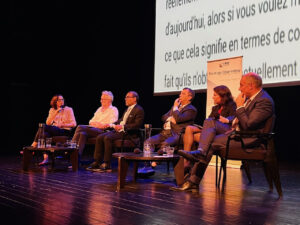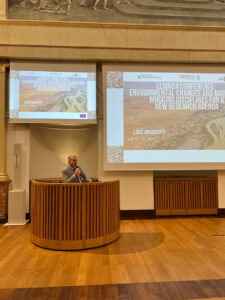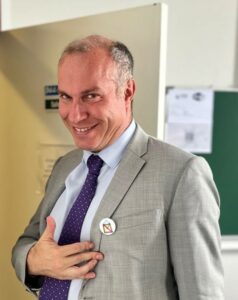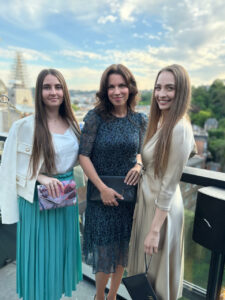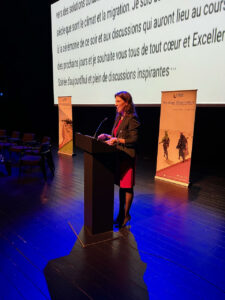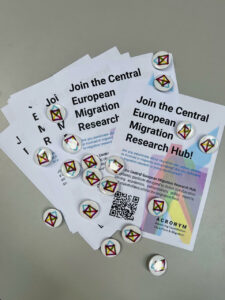Environmental Changes and Migration: Bridging Disciplines for a New Research Agenda
Liège, 9.-12.7.2024
The Acronym Project recently hosted its second annual conference on asylum and migration, titled “Environmental Changes & Migration: Bridging Disciplines for a New Research Agenda,” in Liège, Belgium. The event aimed to gather researchers from various disciplines, policy-makers, and practitioners to foster a multidisciplinary dialogue on migration and asylum governance.
The conference opened with a ceremony at the Liège Theater titled “Climate Justice, Democracy, and Migration Governance” featuring esteemed speakers including Julie Fernandez (Echevin en charge des Solidarités, City of Liège), Pierre Duysinx (Vice-Rector for Mobility and International Affairs, University of Liège), Katarína Csefalvayová (Director of the Institute for Central Europe), and François Gemenne (Director of the Hugo Observatory, University of Liège) who opened the conference and welcomed the guests.
A highlight of the evening was the discussion “Colonizing the Future: Climate Justice, Democracy, and Migration Governance,” led by François Gemenne. Distinguished guests included David van Reybrouck (Historian and Author), Mohamed Nasheed (Secretary General of the Climate Vulnerable Forum, Former President of the Maldives), Saber Hossain Chowdhury (Minister for the Environment, Forest and Climate Change, Bangladesh), Sandrine Dixson-Declève (President of the Club of Rome), and Katarína Csefalvayová who discussed the historical aspect that affect contemporary migration flows, international responses to migration but also role of markets, loss and damage and many other aspects that influence international migration. Last but least, Christian Kaelin, Founder and Chairman of the Andan Foundation, concluded the evening by presenting his new book, “Citizenship and Human Rights.”
The second day began with a keynote address from François Gemenne, followed by three parallel paper presentation sessions on various migration topics, such as policy and governance, gender and social justice, (im)mobilities, and empirical studies. During these research presentations, climate migration, human rights, role of gender, policies and national as well international responses were discussed.
The day was concluded with a panel titled “Global Cities for Climate Refugees,” chaired by Lucy Szaboova from the University of Exeter, featuring Christian Kaelin (Founder and Chairman of the Andan Foundation), Mohamed Nasheed (Secretary General of the Climate Vulnerable Forum), Dina Ionesco (Senior Advisor on Migration to the Climate Vulnerable Forum and Vulnerable 20 Group) discussing role of cities within asylum and migration.
Day three started with three parallel paper presentation sessions, each consisting of a number of presentations followed by discussion periods on climate refugees, migration and asylum policies including EU Temporary Protection Directive. Afterwards Harald Sterly and Simon Alexander Bunchuay-Peth from University of Vienna led a plenary session on Environmental and Climate Mobilities Network and its development. The second day of the conference was concluded by a gala dinner and informal networking.
The final day featured interactive workshops designed to foster collaborative learning and discussion in form of concluding workshops titled “Media, Culture, and Climate Migration” with Sophia Brown (Freie Universität Berlin), David Durand-Delacre (UN University Institute for Environment and Human Security), Elena Giacomelli (University of Bolognaand) and “Planetary Politics and Climate Mobilities” workshop facilitated by Simona Capisani (Danish Institute for International Studies) and Ingrid Boas (Wageningen University). These workshops aimed to delve deeper into specific aspects of climate migration, exploring media representation and the global political landscape.
The “Environmental Changes and Migration: Bridging Disciplines for a New Research Agenda” conference provided an enriching experience for all those involved in the study or practice of migration and asylum. By bringing together a diverse group of participants, the conference aimed to bridge knowledge gaps and foster innovative research agendas to address the pressing challenges of climate (im)mobilities. Don’t miss the chance to be part of a global dialogue on shaping the future of climate migration research and policy, and follow us for more information!
